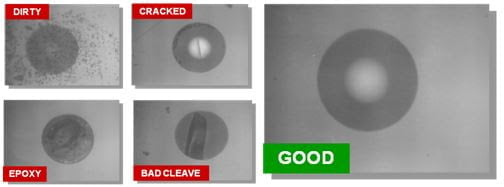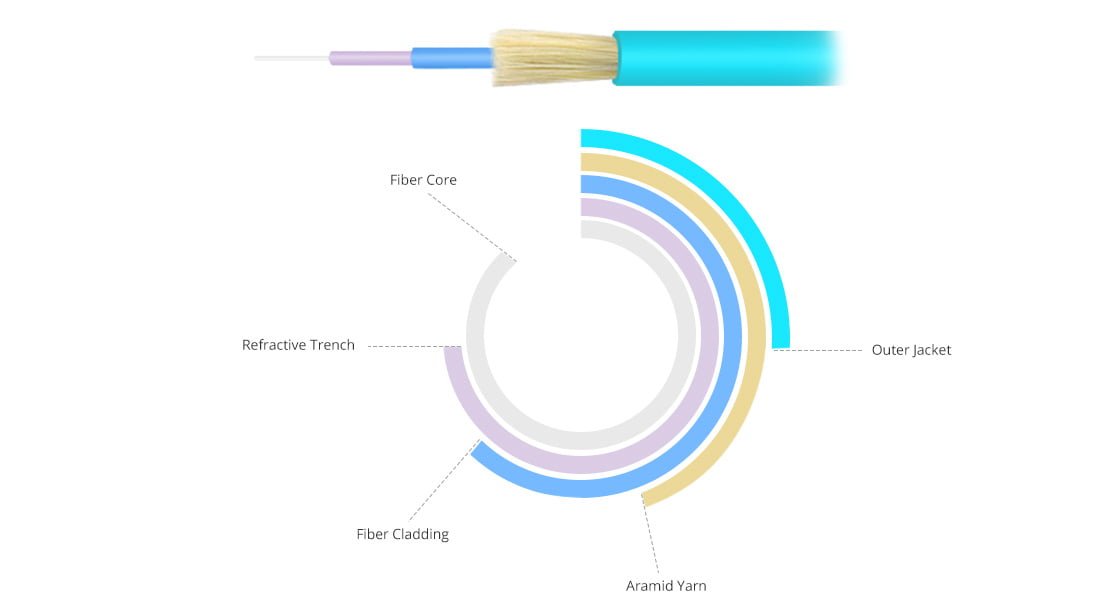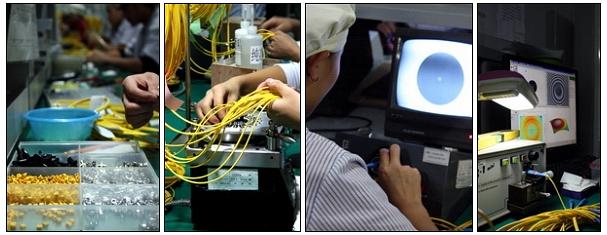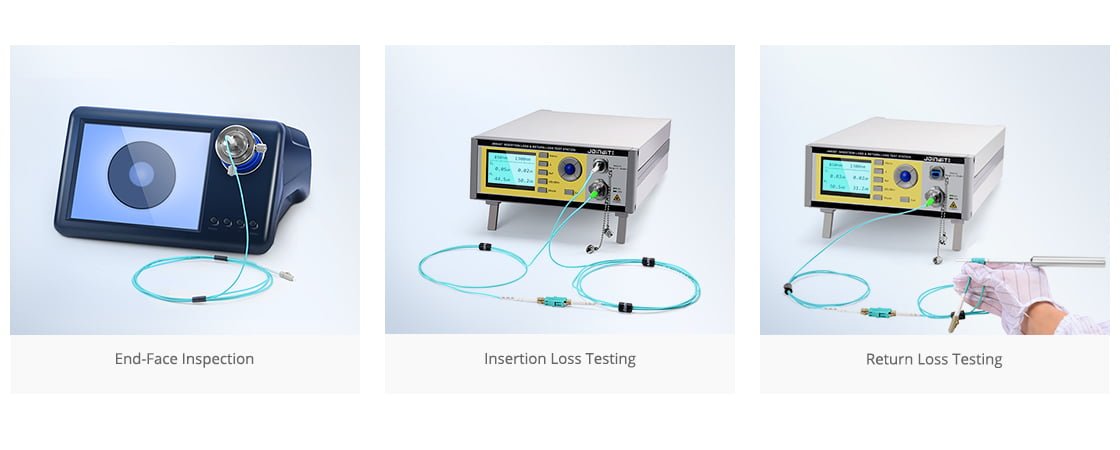SC/APC 6 Core (Fiber) Pigtail SM 9/125 900um 3 Mt
$7.50
SC/APC 6 Core (Fiber) Pigtail SM 9/125 0.9mm 3 Mt with competitive price.We supply quality SC/APC 6 Core (Fiber) Pigtail SM 9/125 that are 3 meters long with 900um outer jacket. Ideal for fusion splicing.
What Is SC/APC 6 Core (Fiber) Pigtail SM 9/125 0.9mm 3 Mt?
SC/APC 6 Core (Fiber) Pigtail SM 9/125 0.9mm 3 Mt with competitive price.We supply quality SC/APC 6 Core (Fiber) Pigtail SM 9/125 that are 3 meters long with 900um outer jacket. Ideal for fusion splicing.We also offer custom-made specification pigtails, please contact us for details.A fiber pigtail is a specific hardware connection used for cable termination. On a fiber pigtail, one end of the wire is simply exposed fiber and the other end has a per-installed connector on it. Fiber pigtails are commonly spliced onto individual strands of a multi-fiber trunk cable.
Pigtails. A fiber pigtail is a single, short, usually tight-buffered, optical fiber that has an optical connector per-installed on one end and a length of exposed fiber at the other end. The end of the pigtail is stripped and fusion spliced to a single fiber of a multi-fiber trunk.
Fiber optic pigtail is a fiber optic cable terminated with a factory-installed connector on one end, leaving the other end terminated. Hence the connector side can be linked to equipment and the other side melted with optical fiber cables.
Features of SC/APC 6 Core (Fiber) Pigtail SM 9/125 0.9mm 3 Mt:
1) Superior qualified standard PC, APC, UPC, SPC polishing;
2) 100% optic test: Insertion Loss: ≤0.3 (PC); ≤0.2 (APC); ≤0.2 (UPC); ≤0.3 (SPC);
3) 100% optic test: Return Loss: ≥45 (PC); ≥60 (APC); ≥55 (UPC); ≥50 (SPC);
4) φ0.9mm, φ2.0mm, φ3.0mm cable optional;
5) Single mode (9125) or multi mode (50/125 or 62.5/125) fiber available;
6) FC, SC, LC, MU, ST, MT-RJ, etc connector
7) Simplex and duplex connector available; 8) Good exchange ability and good durability;
9) Available in fiber bunch, ribbon fan-out, pigtail available;
10) Meets ISO9001, ROHS and Bell core GR 326-core standards;
11) Customized specifications are welcomed.
Applications:
1) CATV, metro test equipment;
2) Telecommunication networks;
3) Local area networks (LAN);
4) Wide area networks (WAN);
5) Premise installations;
6) Data processing networks;
7) Video and military active device termination.
OS2
single mode fibers are only compliant with ITU-T G.652C or ITU-T G.652D standards, which means OS2 is explicitly applied to the low-water-peak fibers. These low-water-peak fibers are usually used for CWDM (Coarse Wavelength Division Multiplexing) applications.

Single mode vs multimode OM1 , OM2 , OM3 , OM4 , OM5 , OS1 , OS2
Bend Insensitive Fiber Optic Cable Structure A unique refractive trench with low refractive index glass layer in BIF, which reduces in light dispersion upon twisting and bending, ensuring network transmission stably and fast.
PVC Vs LSZH Vs OFNP Cable Jacket
2.0mm vs 3.0mm Cable Diameter
Quality production Stages For Fiber Optic Pigtail or Fiber Pigtail Assembly
So what should be taken into consideration when choosing a ‘good’ product? What are the features that one should look for that defines the quality of any connector or jumper assembly? In order to appreciate the significance of a standard compliant product, one must first understand the process of actually making an optical connector assembly and the potential problems that could occur at each of the stages.
There are three main processes in the termination of a Fiber Optic Pigtail or Fiber Pigtail Assembly, Preparation, Termination and Polishing and a total of 15 steps where negligence at any one of the steps will result in an inferior jumper assembly. Each process consists of small steps, and each step requires strict Quality Control of not only the equipment used, but also how each step is carried out.
preparation of fiber cable
- Stripping of outer cable jacket
- trimming of kevlar fibers to length
- Stripping of 900um buffer
- clean bare fiber
- check fiber for damage
- mix two part epoxy
- degas epoxy
- check ferule id
termination of fiber cable
- inject epoxy and insert fiber
- crimp kevlar to back post
- crimp outer jacket
- cure connector in oven
polishing of connector end face
- cleave fiber
- Remove excess epoxy by hand or machine
- polish end-face by grinding machine
Quality control steps For SC/APC 6 Core (Fiber) Pigtail SM 9/125 900um 3 Mt
Comprehensive performance testing makes sure the cable work more secure and data transmission more reliable and stable in your network.
1-End-Face Inspection
End-Face Inspection Evidently, fiber end-face defects like scratches, pits, cracks, and particle contamination will have a direct impact on the performance, contributing to poor insertion/return loss. Any irregularity that impedes light transmission from one fiber to the other will negatively affect IL and RL.Inspect the connector end face for scratches, defects and contamination to ensure reliable fiber connections.

2-Insertion Loss Testing
Insertion Loss Testing In telecommunications, insertion loss refers to the loss of signal power, calculated as a ratio in dB (decibel), resulting from inserting a device in a transmission line or optical fiber. It can also be referred to as attenuation, which indicates how much the signal loss is by comparing the input power to the output power. A lower insertion loss value indicates a better insertion loss performance. For example, an insertion loss of 0.3dB is better than 0.5dB.
3-Return Loss Testing
Return Loss Testing When a signal is transmitted through a transmission line, some signal power is always reflected or returned to the source due to discontinuities in the transmission line. The discontinuity can be a mismatch with the terminating load or with a device inserted in the line. Return loss refers to the loss of reflected signal power. Therefore, the higher the return loss is, the lower the amount of reflection will be. That is to say, the fiber connector will have better performance with a higher value of RL.
4-3D Interferometer Testing
3D Interferometer Testing Test connectors or ferrules of cables to ensure that radius of curvature, the apex offset and fiber height can meet and exceed industry standards.
SC/UPC 6 Core (Fiber) Pigtail OM3 MM 50/125 Fan-out Jacketed
We supply the SC UPC fiber optic cables and connectors, adapters, attenuators. SC/UPC is used in multi media, CATV, and premise installation.SC Pigtail Multimode
| Connector Type |
SC |
|---|---|
| Fiber Mode |
Single Mode |
| Fiber Type |
SM G.652D 9/125 OS2 ,SM G.657A1 9/125 OS2 ,SM G.657A2 9/125 OS2 |
| Fiber Count |
6 Fiber |
| Cable Diameter |
0.9mm |
| Polish Type |
APC |
| Cable Jacket |
LSZH |
| HS Code |
85367000 |
| Brand |
OEM |









Adrianna –
Efficient data transfer with minimal latency using these pigtails.
Rupert –
Great product, very satisfied with the purchase of these pigtails.
Gladys –
Perfect for upgrading our network infrastructure with these pigtails.